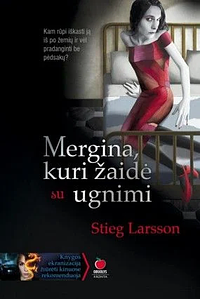Take a photo of a barcode or cover
I"m going to have to read the 3rd book now since this ends right in the middle....
mysterious
tense
medium-paced
HUUUUUUUUGE cliff hanger. Don't even think you can read this one without reading the last.
Read Nora Ephron's homage/parody of these books. She captures their maddening addictiveness best:
http://www.newyorker.com/humor/2010/07/05/100705sh_shouts_ephron
http://www.newyorker.com/humor/2010/07/05/100705sh_shouts_ephron
Everything that seemed unnecessary and gratuitously misogynistic in the first book (The [b:Girl with the Dragon Tattoo|2429135|The Girl with the Dragon Tattoo (Millennium, #1)|Stieg Larsson|http://photo.goodreads.com/books/1275608878s/2429135.jpg|1708725]) is explained in this book. We finally get the back story on Salander, and she emerges as an even more compelling heroine in this Swedish potboiler. Perhaps a few too many references to IKEA and 7 Elevens, but otherwise a thrilling read that I couldn't put down.
I really love the characters and the writing style moves the story along fairly swiftly. It is a little difficult to get through the names of places because they're quite different from American names and so a few times I got confused about who was who with the minor-er characters and the places they were going, but overall it's a great book and I'm really looking forward to the third one.
After reading the first book in this series, I had to read the second. I'd like to give it more than 3 stars because the ending was great! It was full of action and the ending left me wanting to read more. This book is well written, but I feel as though the author could have left out some of the unimportant detail.
dark
mysterious
tense
medium-paced
Plot or Character Driven:
A mix
Strong character development:
Yes
Loveable characters:
Complicated
Diverse cast of characters:
Yes
Flaws of characters a main focus:
Yes
I have a complicated relationship with these books. On one hand, the main plot of both books has been dynamic and compelling. The friendship between Mikel and Lisbeth is strong and well developed which keeps me coming back for more. On the other hand, there is so much going on here that it is sometimes overwhelming.
The first fifth of this book could have been cut. Why do we need the main character sleeping with a teenager? Why do we need to see her leave an abuser for dead in the middle of a hurricane? None of this was relevant to the main plot. I honestly kept waiting for these plot points to come back, and they never did.
There are also so many characters, and we hop in and out of all of their point of views. Sometimes, I forget what character we are talking about and have to wiki it, so that I'm not flipping back and forth trying to recall. I feel as if Stieg Larsson had chosen a couple of characters whose point of view he chose to highlight, the writing would be clearer.
Of course, this book was still so interesting. I like how it concentrated on fleshing out Lisbeth's background and made that the core of the mystery. After the first novel, I felt like we got a good sense of Lisbeth's personality but no reasoning as to why he was the way she was. In fact, despite being called "The Girl with the Dragon Tattoo," the first novel really focuses on Mikel's history.
Overall, I think I like the core of this novel more than the first in the series, although I was more confused by the details of it. It is certainly a unique and captivating thriller.
The first fifth of this book could have been cut. Why do we need the main character sleeping with a teenager? Why do we need to see her leave an abuser for dead in the middle of a hurricane? None of this was relevant to the main plot. I honestly kept waiting for these plot points to come back, and they never did.
There are also so many characters, and we hop in and out of all of their point of views. Sometimes, I forget what character we are talking about and have to wiki it, so that I'm not flipping back and forth trying to recall. I feel as if Stieg Larsson had chosen a couple of characters whose point of view he chose to highlight, the writing would be clearer.
Of course, this book was still so interesting. I like how it concentrated on fleshing out Lisbeth's background and made that the core of the mystery. After the first novel, I felt like we got a good sense of Lisbeth's personality but no reasoning as to why he was the way she was. In fact, despite being called "The Girl with the Dragon Tattoo," the first novel really focuses on Mikel's history.
Overall, I think I like the core of this novel more than the first in the series, although I was more confused by the details of it. It is certainly a unique and captivating thriller.
I have finally gotten the opportunity to finish Larsson's second installment of the Millenium Trilogy, two or so years after reading The Girl with the Dragon Tattoo. In terms of writing a review, I am as perplexed as to what to say, just as I was after the first book. I give it four stars because though I didn't feel the Earth shake upon completion, at the end, I had forgotten about all of the negative opinions I had formed during the first section and a half of the book and found myself gratified at how it played out.
While I was non-committal as to my assessment of Larsson's writing style in my previous review, I am now solidly in the camp that enjoys his narrative abilities. I am convinced that, had he lived, he would be to the police detective/investigation/espionage genre what John Grisham is to "legal fiction". Larsson is skilled at weaving a complex narrative, creating and integrating a wide range of characters, and has an interesting way of revealing details very early in a narrative only to NOT ruin the inevitable final revelation of those details in the end. For example, you could suspect very early on that Niedermann was the killer, but his relationship with Zala, his relationship to Salander, etc. was paced nicely (and intuitively).
My review would be incomplete if I did not comment on the Salander character. Two very close friends of mine, whose literary opinions I respect very much, love her character. I find her (simultaneously) maddeningly under-developed and over-developed. (Though I will admit that her character came into focus as this novel wore on.) Her mystique was justified in "Dragon Tattoo" and I had no problem with the peripheral details of her life and why she was the way she was. She was an accessory to the main plot and provided a nice change of pace in the form of a sub-plot, just as the Blomkvist character did. I just don't feel that she can be the central character of a piece of fiction without portions of the work delving into the overly cliche. Whereas Larsson is skilled at withholding details as to the central "case" of his novels, I find his attempts to do so with a character frustrating and, at times, jarring. Just about the time we start to sketch a picture of Lisbeth, we are given something else that shatters that image. With some characters this isn't a bad thing; but in the case of Lisbeth, there's little consistency with the other aspects that we've learned. For instance, I found her points of vanity (e.g., the cosmetic surgery, the details of her relationship with George Bland, the furnishing of her apartment, etc.) in "Played with Fire" too far removed from what we had learned in "Dragon Tattoo". Vulnerability I would have welcomed; vanity was too far in the direction of "she's really just like any other girl". I will admit that I have no knowledge of the mental condition with which she is most closely associated (Aspergers), which may push me toward such a conclusion.
Larsson obviously asserts his themes of injustice and morality through Lisbeth, but the injustices dealt to her border on the edge of any realistic plausibility. Portions of her character feel like a writing exercise - i.e., how many bad things can we make happen to this girl? She was abused and that had led to a number of failed and abusive relationships as she grew older - I can appreciate such details. Her abuse and subsequent actions keep her on the radar of a number of law enforcement agencies - plausible, but questionable. She is secretly watched as a central figure in national security and part of a supreme cover up? Not sure about that one...
Consequently, my disconnect with the Salander character made the first 300 or so pages of this book extremely difficult for me. Much like other reviews that I have read, I found myself wondering when we were going to launch toward the central mystery of the book. Upon launch, I couldn't put the book down. Further, I enjoyed the minor themes of power, considering alternate definitions of success as well as love, and revenge and found them suitable additions to the narrative.
I look forward to reading The Girl Who Kicked the Hornet's Nest and have a copy of it on my shelf, but I will take a much-needed step away from the seemingly unending crime drama of Sweden.
While I was non-committal as to my assessment of Larsson's writing style in my previous review, I am now solidly in the camp that enjoys his narrative abilities. I am convinced that, had he lived, he would be to the police detective/investigation/espionage genre what John Grisham is to "legal fiction". Larsson is skilled at weaving a complex narrative, creating and integrating a wide range of characters, and has an interesting way of revealing details very early in a narrative only to NOT ruin the inevitable final revelation of those details in the end. For example, you could suspect very early on that Niedermann was the killer, but his relationship with Zala, his relationship to Salander, etc. was paced nicely (and intuitively).
My review would be incomplete if I did not comment on the Salander character. Two very close friends of mine, whose literary opinions I respect very much, love her character. I find her (simultaneously) maddeningly under-developed and over-developed. (Though I will admit that her character came into focus as this novel wore on.) Her mystique was justified in "Dragon Tattoo" and I had no problem with the peripheral details of her life and why she was the way she was. She was an accessory to the main plot and provided a nice change of pace in the form of a sub-plot, just as the Blomkvist character did. I just don't feel that she can be the central character of a piece of fiction without portions of the work delving into the overly cliche. Whereas Larsson is skilled at withholding details as to the central "case" of his novels, I find his attempts to do so with a character frustrating and, at times, jarring. Just about the time we start to sketch a picture of Lisbeth, we are given something else that shatters that image. With some characters this isn't a bad thing; but in the case of Lisbeth, there's little consistency with the other aspects that we've learned. For instance, I found her points of vanity (e.g., the cosmetic surgery, the details of her relationship with George Bland, the furnishing of her apartment, etc.) in "Played with Fire" too far removed from what we had learned in "Dragon Tattoo". Vulnerability I would have welcomed; vanity was too far in the direction of "she's really just like any other girl". I will admit that I have no knowledge of the mental condition with which she is most closely associated (Aspergers), which may push me toward such a conclusion.
Larsson obviously asserts his themes of injustice and morality through Lisbeth, but the injustices dealt to her border on the edge of any realistic plausibility. Portions of her character feel like a writing exercise - i.e., how many bad things can we make happen to this girl? She was abused and that had led to a number of failed and abusive relationships as she grew older - I can appreciate such details. Her abuse and subsequent actions keep her on the radar of a number of law enforcement agencies - plausible, but questionable. She is secretly watched as a central figure in national security and part of a supreme cover up? Not sure about that one...
Consequently, my disconnect with the Salander character made the first 300 or so pages of this book extremely difficult for me. Much like other reviews that I have read, I found myself wondering when we were going to launch toward the central mystery of the book. Upon launch, I couldn't put the book down. Further, I enjoyed the minor themes of power, considering alternate definitions of success as well as love, and revenge and found them suitable additions to the narrative.
I look forward to reading The Girl Who Kicked the Hornet's Nest and have a copy of it on my shelf, but I will take a much-needed step away from the seemingly unending crime drama of Sweden.
I loved this book even more than the first and can't wait to read the last one! The plot twists aren't totally unexpected but I was so caught up in the moment that I didn't even have the time to analyze what might come next. I would highly recommend this book!






